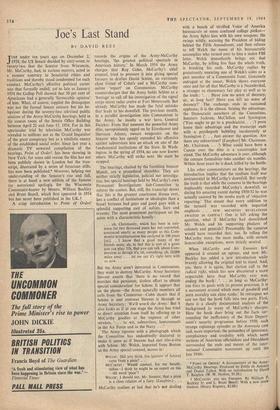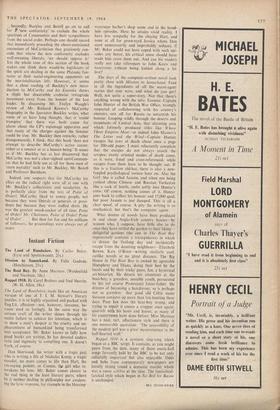Joe's Last Stand
BY DAVID REES JUST under ten years ago on December 2, 1954, the US Senate decided by sixty-seven to twentyltwo that the Senator from Wisconsin, Mr. McCarthy, had, in various matters, acted in a manner contrary to Senatorial ethics and traditions and thereby stood condemned for such conduct. McCarthy's effective political career was thus formally ended; yet as late as January 1954 the Gallup Poll showed that 50 per cent of Americans had a generally 'favourable opinion' of him. What, of course, toppled the demagogue was not the formal Senate censure but his be- haviour during the seventy-two televised public sessions of the Army-McCarthy hearings, held in the caucus room of the Senate Office Building between April 22 and June 17, 1954. For in this spectacular trial by television McCarthy was revealed to millions not as the Grand Inquisitor of the great conspiracy but as a nihilistic enemy of the established social order. Since last year a dramatic TV newsreel compilation of the hearings, Point of Order!, has been showing in New York; for some odd reason the film has not been publicly shown in London but the tran- script, illustrated by a series of ferocious stills, has now been published.* Morover, helping our understanding of the Senator's rise and fall, there is at hand a new edition of the famous (or notorious) apologia for the Wisconsin Communist-hunter by Messrs. William Buckley and Brent Bozell, which first appeared in 1954 but has never been published in the UK.t A crisp introduction to Point of Order!
records the origins of the Army-McCarthy hearings, 'the greatest political spectacle in American history.' In March 1954 the Army charges that Roy Cohn, McCarthy's chief counsel, tried to pressure it into giving special favours to draftee David Schine, an extremely close friend of Cohn's and a McCarthy com- mittee 'expert' on Communism. McCarthy countercharges that the Army holds Schine as a 'hostage' to call off his investigation of the signal corps secret radar centre at Fort Monmouth. But already McCarthy has made the fatal mistake that leads to his downfall. The previous month, in a parallel investigation into Communism in the Army, he insults a war hero, General Zwicker. From that moment the powerful Army elite, surreptitiously egged on by Eisenhower and Sherman Adams, swears vengeance on the Senator who has openly extended his offensive against subversives into an attack on one of the fundamental institutions of the State. In Wash- ington, in the spring of 1954, no one now knows where McCarthy will strike next. He must be stopped.
The hearings, chaired by the fumbling Senator Mundt, are a procedural shambles. They are neither strictly legislative, judicial nor investiga- tive, but special hearings held by McCarthy's own Permanent Investigations Sub-Committee to referee the contest. But, still, the transcript shows that this is the greatest courtroom drama ever, less a conflict of institutions or ideologies than a brawl between bad guys and good guys with a splendid supporting cast of softies, liars and cravens. The most prominent participant set the scene with a characteristic homily:
. . . uh, Christianity, which has been in exis- tence for two thousand years has not converted, convinced nearly as many people as this Com- munist brutalitarianism has enslaved in 106 years [sic]. I know that a good many of my friends seem, uh, to feel this is sort of a game you can play. Uh, that you can talk about Com- munism as though it's, uh, something, uh, 10,000 miles away . . . let me say it's right here with us now. . . .
But the Army aren't interested in Communism, they want to destroy McCarthy. Army Secretary Stevens asserts that 'there is no record that matches this persistent, tireless effort to obtain special consideration' for Schine. It appears that on the phone—the Army naturally monitors all calls from the Committee—Cohn shouts that if Schine is sent overseas Stevens is through as Army Secretary : 'We'll- wreck the Army.' But it also looks as if at one stage the Army has tried to divert attention from itself by offering up to McCarthy goodies at the expense of other
services, . . to wit, subversives, homosexuals in the Air Force and in the Navy. . .
The Army ripostes with a photograph which the Committee has undoubtedly doctored to make it seem as if Stevens had met iere-a-tete with Schine. Mr. Welch, imported from Boston as the Army special counsel, moves in : WELCH: Did you think this [picture of Schine] came from a pixie? . . .
MCCARTHY: Would counsel, for my benefit, define—I think he might be an expert on this --the word 'pixie'?
WELCH: I should say, Mr. Senator, that a pixie is a close relative of a fairy. (Laughter.) . . .
McCarthy realises at last that he's not dealing
with a bunch of terrified Voice of America bureaucrats or some confused college pinkos- the Army fights him with his own weapons. He swings wildly, accusing the President of hiding behind the Fifth Amendment, and then refuses to tell Welch the name of his bureaucratic accomplice who turned over to him a stolen FBI letter. Welch immediately brings out that McCarthy, by telling less than the whole truth, is breaking his oath. McCarthy replies by gratuitously smearing one of Welch's aides as a past member of a Communist front. Genuinely outraged at the smear, Welch shows everyone once and for all that McCarthy is 'a Neanderthal, a stranger to elementary fair play as well as to the truth: . . Have you no sense of decency, sir, at long last? Have you left no sense of decency?' The exchange ends in sustained applause; it is the climax. Seizing the advantage, the Democratic members of the Committee, Senators Jackson, McClellan, and Symington ('You ought to go to a psychiatrist. . . .') press home their advantage and the transcript ends with a psychopath babbling incoherently at Symington ('. . . Just answer the question. Are there any subversives? [Laughter] Mr. Chairman, Mr. Chairman. . . .') What could have been a Cannue over the elite is a catastrophic last stand. The McCarthy adventure is over, although the censure formalities take another six months. Within three years he is dead, killed by the bottle.
Like other commentators on the hearings, the introduction implies that the medium itself was instrumental in McCarthy's downfall. But surely the truth is that while the cameras in the-hearings implacably recorded McCarthy's downfall, so during his amazing ascent during 1950-52 he was actually assisted by the media myth of 'objective reporting.' This meant that every addition to the turmoil was recorded with impartial emphasis. . . . NEW MCCARTHY REVELATIONS AWAITED IN CAPITAL! One is left asking the question, what if McCarthy had demolished Mr. Welch and his supporting phalanx of colonels and generals? Presumably the cameras would have recorded that, too. In telling the McCarthy story, the mass media, with certain honourable exceptions, were strictly neutral.
When McCarthy and his Enemies first appeared it created an uproar, and now Mr. Buckley has added a new introduction while bravely allowing the original text to stand. And, yes, there it is again, that clarion call to the radical right, which has now discovered a more respectable hero than McCarthy ever was, ending the book: . . as long as McCarthy- ism fixes its goals with its present precision, it is a movement around which men of goodwill and stern morality can close ranks.' In retrospect we can see that the book falls into two parts. First, there is a closely documented analysis of the background to many of McCarthy's charges. Here the book does bring out the facts sur- rounding the inefficiency of the State Depart- ment's security programme before 1950, such strange espionage episodes as the A tnerasia case and, more important, the penumbra of ignorance, complacency and credulity with which some sections of American officialdom and liberaldom surrounded the ends and means of the inter- national Communist movement up until the late 1940s.
* POINT OF ORDER! A documentary of the Army- McCarthy Hearings. Produced by Emile de Antonio and Daniel Talbot. With an introduction by David T. Bazelon. (W. W. Norton, $1.50.) t MCCARTHY AND HIS ENEMIES. By William P. Buckley Jr. and L. Brent Bozell. With a new intro- duction. (Henry Regnery, $2.00.)
Secondly, Buckley and Bozell go on to call
for 'new conformity' to exclude the whole spectrum of Communists and their sympathisers from the social order. Perhaps one should record that immediately preceding the above-mentioned encomium of McCarthyism they graciously con- cede that where the new conformity excludes well-meaning liberals, 'we should' oppose it.' Yet the whole tone of this section of the book. makes one think these would-be legislators of the spirit are dealing in the same Platonic fan- tasies as their social-engineering opponents on the neo-totalitarian left. However, it seems that a close reading of Buckley's new intro- duction to McCarthy and his Enemies shows a slight but discernible crabwise retrograde movement away from the banner of the lost leader. In discussing Mr. Evelyn Waugh's review of Mr. Richard - Rovere's McCarthy biography in the Spectator Buckley writes, what some of us have long thought, that it 'could transpire' that there was both cause for alarm about the CP's espionage- apparatus and that many of the charges against the Senator could be true. Mr. Buckley then remarks, rather disingenuously, I think, that this book 'does not attempt to describe McCarthy's active career, either as a senator or as a human being.' It seems as if Mr. Buckley has at last discovered that McCarthy was not- a clear-sighted anti-Commun- ist; that he had little use at all for those men of 'stern morality' such as Mr. Buckley, Mr. Bozell and Professor Burnham.
Indeed, one suspects that for McCarthy his allies on the radical right were all at one with Mr. Buckley's collectivists And secularists. As is. perfectly • clear from the text of Point of Order!, McCarthy liked to annoy people, not because they were liberals or generals or presi- dents but beCause they were stuffed shirts. He was the greatest snook-cocker of all time. Point of. Order! Mr. Chairman, Point of Order!'Point Of Order! . . . But then for Joe and his millions of. follo\■ crs, the proceedings were always out of order.



































 Previous page
Previous page